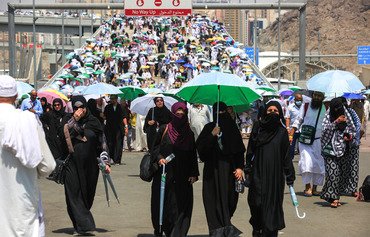Hajj and Umrah agencies in Yemen say they have stopped registering applicants for Hajj this year due to the high number of advance registrations, despite an increase in the quota for Yemeni pilgrims.
The Ministry of Endowments and Guidance previously announced that those who wish to perform Hajj in 2017 could register between May 11th and 31st.
In a statement carried by local media, Minister of Endowments and Guidance Ahmad Attiyah announced that the Hajj services sector had completed all the arrangements necessary to ensure the success of the annual pilgrimage.
The ministry has approved 151 agencies to register pilgrims across the country, he said, and set the amount of 5,850 Saudi riyals ($1,560) as a standard fee.
Hajj fees cover the cost of accommodation in Mecca, transportation to the Grand Mosque and Medina, as well as additional services and administrative fees.
Attiyah warned prospective pilgrims not to engage with unauthorised agencies or pay fees other than those set by the ministry, as this could result in their names being removed from the lists.
The ministry has put controls in place to ensure the return of pilgrims to Yemen after completing the Hajj rituals, he said, adding that legal action will be taken against establishments that fail to comply with the ministry's standards.
Last year, he said, just 1% of Yemeni pilgrims failed to return, after the ministry enforced laws mandating that Hajj agencies ensure their pilgrims return to Yemen. Stringent controls remain in place this year, he added.
High demand
Hajj and Umrah agency officials said there had been a huge turnout to register and reserve seats for the pilgrimage in advance, causing the reservation process to close before the start of the official registration period.
"Although the quota for Yemeni pilgrims went from 18,000 to 24,000, the turnout is high, and the agency already completed the registration of pilgrims in its branch in Hadramaut province two months ago," al-Hadrami Hajj and Umrah Agency director Salem bin Tayeh told Al-Mashareq.
"Al-Hadrami agency’s allotted number of pilgrims is 180, and the group-transport process begins in the upcoming month of Dhu al-Qidah [which starts on July 24th this year]," he said.
Because of the limited number of pilgrims last year, he said, and as no pilgrims were allowed in 2015 because the war prevented authorities in both countries from completing the arrangements, there was an increase in demand this year.
This spurred people to reserve seats before the registration process was officially opened, he said.
Al-Tayeh said the agency is unable to accept new applications because all the seats it has been allotted are reserved.
Travel via land routes
Al-Isa'i Agency for Travel, Hajj and Umrah sales manager Badr al-Assad told Al-Mashareq the agency completed the registration process for its 200 seats as soon as the announcement of the opening of registration was made.
"Pilgrim reservations this year were carried over from last year for pilgrims whom the agency was unable to send to the holy sites for various reasons," he said.
The agency is accepting waiting list applications in case a pilgrim is unable to go for health reasons or for reasons related to travel, he said, which this year is by land only.
"Some pilgrims request to travel by air, which is not an option due to the circumstances this year," he said.
One of the reasons for the high demand for reservations is that the seats are in 4th class economy, which is the most affordable way to travel, said Mohammad Jheish, sales manager at al-Hajar al-Aswad Hajj and Umrah Agency.
"This is commensurate with the financial ability of the majority of Yemenis, and the most in demand compared to previous years," he told Al-Mashareq.
Jheish said his agency will send 50 pilgrims this year, and was only allotted seats for its branch in Hadramaut, which put the agency in a tight spot in Sanaa, where it had to turn down many applications.

![Pilgrims gather in Mecca to perform the Hajj in a previous season. Large numbers of Yemenis are traveling to perform the religious ritual this year, and agencies have stopped accepting registrations as they have reached full capacity. [Photo courtesy of Samy al-Banna]](/cnmi_am/images/2017/05/26/7962-Saudi-Mecca-Hajj-600_384.jpg)






